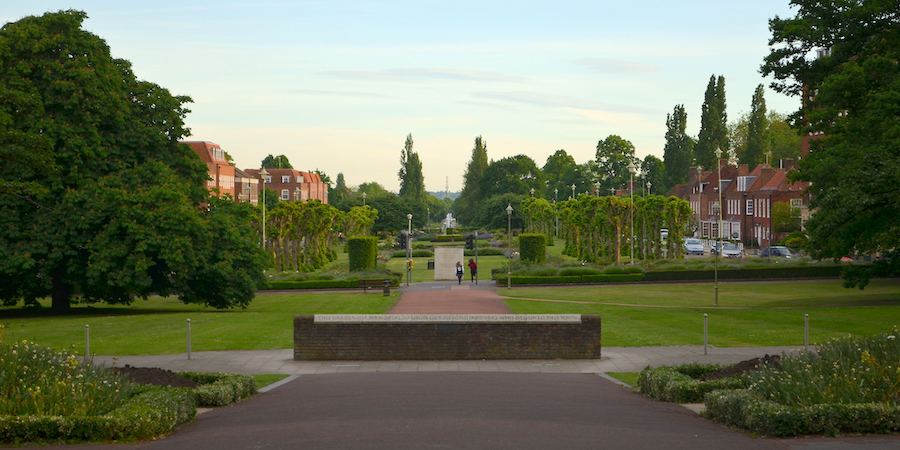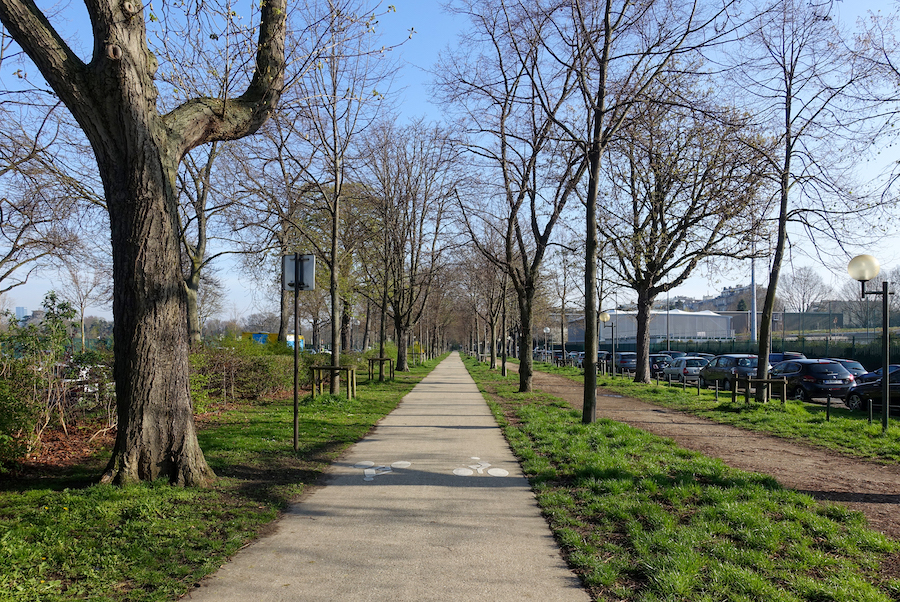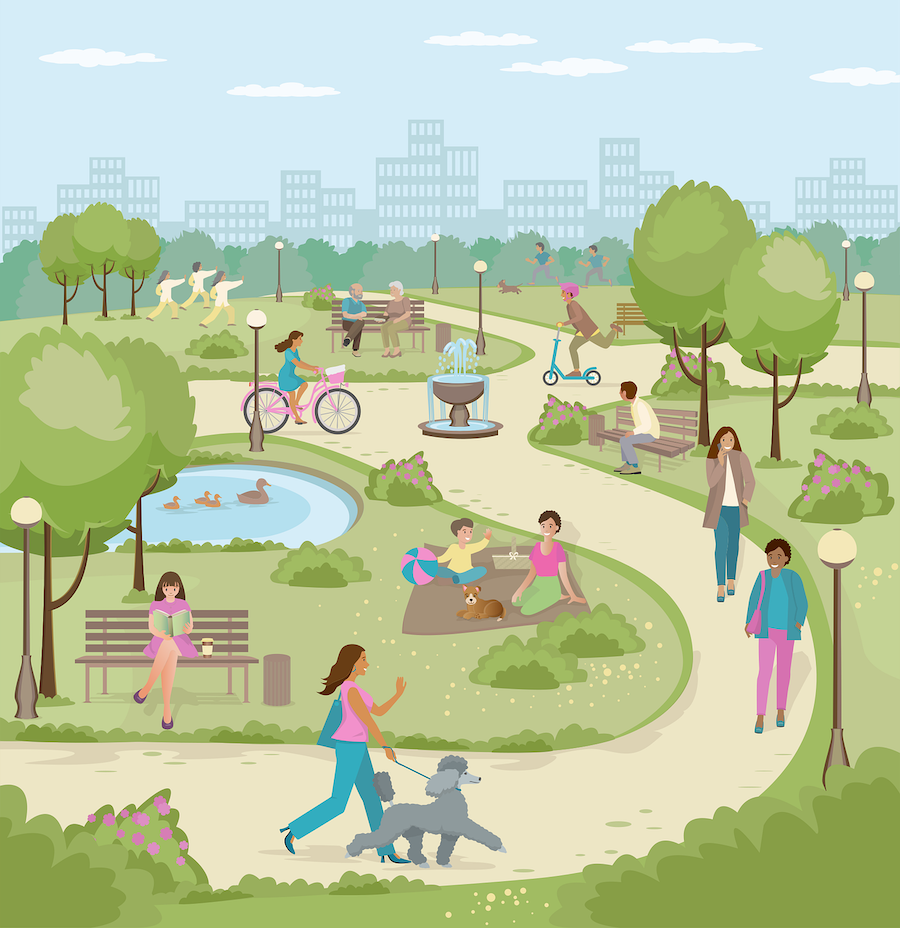Cities / Compact cities
From garden cities to 20-minute neighbourhoods – insights into creating complete, compact and connected places for human and planetary thriving
By Gemma Hyde | 12 Dec 2022 | 0
Gemma Hyde outlines the Town and Country Planning Association’s implementation work and learning on 20-minute neighbourhoods, in addition to highlighting areas for further research on creating healthier, more equal places for all.
Author of scientific paper:
Abstract
Societies around the world are facing urgent, complex and interconnected problems, many of which are driving high levels of deprivation, social inequalities and poor health outcomes across the life course. These inequalities in life experience can have deeply detrimental effects on individuals, families, communities and society.
In the face of this challenge, disparate places are seeking to create places that better foster conditions for human and planetary thriving, and there is growing evidence that people are healthier when they can live locally in complete, compact and connected communities.
These types of communities can be described in different ways, including 20-minute neighbourhoods and 15-minute cities. But the essence of the idea is the same – allow people to live in walking-first neighbourhoods, where they can access each other and the facilities and services that they need for everyday living, helping those in most need first.
In 2021, the Town and Country Planning Association (TCPA) launched a practical guide to 20-minute neighbourhoods for council planners in England, and we have spent the last 18 months learning from and supporting places to implement healthier communities. The emergent learning from this work is providing insight into the barriers and opportunities that a 20-minute framework offers to healthier placemaking.
Emerging themes and barriers include: that the 20-minute neighbourhood framework is instinctively appealing to communities and placemaking professionals; that a compelling, bold, locally defined 20-minute neighbourhood vision is crucial to shaping places over the long term; that progress in England is being hindered by a highly challenging and complex policy and resourcing context; and that complete, compact and connected neighbourhoods can only be created through working with and across multiple government, non-government and community organisations.
This paper will present the TCPA’s implementation work and learning so far, adding to the growing knowledge and evidence base for creating thriving, more equal places for all, through a 20-minute neighbourhood framework.
Keywords
In England in the late 19th century, Ebenezer Howard took a radical and holistic approach to town planning, striving to create beautiful, healthy and sociable communities, in which everyone could live and where income from rising land values was kept within the community to support the local economy and the welfare of residents1. Howard called these communities “garden cities”, merging the opportunities and benefits of cities – a range of employment, culture and easy connectivity – with the opportunities and benefits of the country, including clean air, access to nature, and locally produced healthy food. 
The original garden cities were among the first attempts at sustainable development, where people could lead healthier lives, in better balance with the natural world. Sadly, through the 20th century, Howard’s placemaking ideas were eroded and far less radical developments, while bearing the name ‘garden’ towns and villages, were brought forward2. In the 21st century, however, there has been a resurgence of interest in creating more complete, compact and connected places to solve the complex issues of the time, namely the climate emergency, an epidemic of preventable poor health, and desperate, growing inequality. Different places are naming these re-imagined communities differently – 15-minute cities, 20-minute neighbourhoods, complete communities – but the name is not important. These places are being created in recognition that they better support human and planetary thriving.
Background
Societies across the world are facing urgent, interconnected problems. How to reduce carbon emissions? How to help people become more active to improve their physical and mental health? How to reduce air pollution? How to reduce loneliness? How to ensure that everyone can access and afford to eat healthy food? How to reverse the decline in local high streets and economies? How to ‘level up’ towns and neighbourhoods that have declined and make them great places in which to live again?
In 2021, the Town and Country Planning Association (TCPA), as part of its work to support healthier placemaking, published an introductory guide to 20-minute neighbourhoods and how, in the context of English planning policy3, councils in England might deliver them.
 The guide was written at a time of great uncertainty and change – during the Covid-19 pandemic, increasing urgency to tackle climate change, and during a period of ongoing and potentially far-reaching change to the English planning system. The guide introduces council planners to the wide-ranging potential benefits of 20-minute neighbourhoods and the role that planners could play, in collaboration, to bring them about. The guide encourages the uptake and adoption of principles related to the 20-minute neighbourhood within planning policies and decisions.
The guide was written at a time of great uncertainty and change – during the Covid-19 pandemic, increasing urgency to tackle climate change, and during a period of ongoing and potentially far-reaching change to the English planning system. The guide introduces council planners to the wide-ranging potential benefits of 20-minute neighbourhoods and the role that planners could play, in collaboration, to bring them about. The guide encourages the uptake and adoption of principles related to the 20-minute neighbourhood within planning policies and decisions.
Since the guide’s publication, the TCPA has continued to promote and support the concept of 20-minute neighbourhoods, convening stakeholders to share emergent learning, collating information from the UK and around the world as a resource for those committed to creating healthier places, and promoting the concept at all levels of society, from national government to community groups4.
Twenty-minute neighbourhoods begin to address the problems of place systemically, creating complete, compact and connected neighbourhoods in which people live in safe, suitable and secure homes and can meet most of their daily needs within a short walk or wheel of their front door. It’s a conceptually simple and appealing idea, but it’s complex to put into practice.
Through conversations and feedback, we’ve identified four initial emergent themes that inform the current planning practice environment in England and need to be explored further if we’re going to successfully create thriving places. The themes are covered in turn below.
The 20-minute neighbourhood framework is instinctively appealing to communities and placemaking professionals.
Cities worldwide have declared aspirations to become more sustainable and walkable, allowing all residents the ability to meet most of their daily needs within a short walk or wheel of their homes. Although the exact choice of language varies across communities and countries, our work in England has found that people from different sectors consistently find value in the 20-minute neighbourhood framework.
“The terminology ‘20-minute neighbourhoods’ has been very useful. ‘Sustainable’ doesn’t really mean anything at all, as Rob Cowans called it, ‘sustaina-babble’. That sort of language doesn’t mean anything at all.”
- Urban designer
“For me, it’s a concept that resonates with people and can be used to engage in purposeful conversations.”
- Community sport organisation
“‘20-minute’ or ‘completeness’ are far better ways of defining the objective of improving people’s lives and mean far more to the public than the abstract and ill-defined idea of ‘sustainability’.”
- English local authority planner
“Calling ourselves 15-minute [town] provides a shield against being negatively labelled as ‘the cycling or climate lobby’ and allows us to talk about so many more issues related to creating a healthier town.”
- Community action group
The value of the 20-minute neighbourhood label comes from it being easily understood in a way that more traditional planning and design language around sustainability is not. It also allows a shift away from being associated with any single agenda, opening up a more holistic approach to placemaking. Flexibility in the concept allows places, residents, businesses and politicians to tailor and define what a 20-minute neighbourhood means for them across a broad range of concerns and agendas. Consistently in conversations with groups from all sectors, the concept is considered valuable in placemaking dialogue and practice.
A compelling, bold, locally defined 20-minute neighbourhood vision is crucial to shaping a place for thriving over the long term.
A local, shared definition of issues is key to the long-term success of any 20-minute neighbourhood vision. C40 Cities, a network of mayors across nearly 100 world-leading cities, collaborating to deliver urgent action to confront the climate crisis, notes that planning a 15-minute city should start with establishing a vision. A participatory, inclusive approach to imagining the vision is vital to ensure that it’s grounded in the area’s realities and has a broad base of support5. This need for a clear story about what a place is, how it works and how it could work, has resonated through our exchanges on 20-minute neighbourhoods:
“What matters to you? Just tell us what the problems are, what works, what doesn’t. Let’s go on this journey together.”
- Housing association planner
Our research has also found that a 20-minute neighbourhood framework can be a vehicle for aligning disparate visions, created around singular concerns, in a place-based way. This allows for better discourse around the shared goals and co-benefits of multiple stakeholders:
“We need to relate existing visions to the idea of the 20-minute neighbourhood and generate conversations around how to implement the idea. Not being too precious.”
- Third-sector worker
“We are looking at introducing reference to 20-minute neighbourhoods into policy as part of our Local Plan update (LPU) and incorporating it into our design guidance. Our LPU is focused on climate change but with a recognition that the benefits of climate change are shared with health and wellbeing. The benefits are fully interwoven with quality placemaking, design and transport strategies (active travel, etc.), and a clear need to work across sectors and strategies to delivery.”
- English local authority planner
Any 20-minute neighbourhood vision and use of the framework allows the coalescing of key and complex issues into one idea centred on the creation and development of thriving people and places. It explores and strengthens the links between agendas and provides a potentially powerful vehicle for driving change in a place-based way.
Progress in England is being hindered by a highly challenging and complex context.
In 2019, the Royal Town Planning Institute (RTPI) recognised that under-investment in place and local authority planning departments is linked to our collective failure to solve issues as diverse as spatial economic imbalance, the housing crisis, climate change, deprivation, poor public health outcomes, and an ageing population6. The resourcing and motivation picture of local authority planning hasn’t improved since then and has been further unsettled by proposed and delayed planning policy changes. The 2021-22 Planner Careers Survey found that 67 per cent of planners felt that they and their teams don’t have the resources they need to deliver their goals7. 
Collaborating with local authorities in England, the TCPA consistently hears of the challenges facing planning and other council functions. Typically, these include: a lack of sufficient resourcing to complete statutory tasks; a lack of access to skills and expertise; a lack of national leadership; low morale and an exodus of planners from the public sector8; and a lack of co-ordinated and interdisciplinary working.
“Years of under-resourcing, which are turning into decades, are seriously de-motivating. Sorry to be negative, but it seems to me that the concept of planning itself is dying owing to resource limitations.”
- English local authority planner
“Fundamentally, it means us as planners, we’re having to do everything kind of tied with one arm behind our back, and just kind of muddle through a bit, and I don’t think you’ll get a fundamental change that ideally you want to get, or the outcomes that we should all be striving for.”
- Private-sector planner
“There are constraints around their [planners’] time, capacity and priorities, which can prove difficult. Navigating planning policy is complex and is something I’m constantly learning about.”
- English local authority public health practitioner
In this context, the 20-minute neighbourhood idea can seem an impossible dream:
“Although brilliant for health and wellbeing and social interaction, maximising the benefit of parks, and so on, within the current political landscape, plus the council’s current approach, to me it [20-minute neighbourhoods] seem undeliverable.”
- English local authority planner
As a result of this, in some places, those driving the 20-minute neighbourhood agenda are not local government authorities and actors but rather business leaders and communities who see the benefits and want to influence places despite local political and resourcing challenges. This contrasts with many international cities and places implementing 15- and 20-minute neighbourhoods, where the context is politically more robust and better resourced.
Complete, compact and connected neighbourhoods can only be created through working with and across multiple government, non-government and community organisations.
The 20-minute neighbourhood concept is a holistic approach to placemaking. It acknowledges the interrelationships between varied factors in creating healthy and thriving communities. As such, 20-minute neighbourhoods cannot be realised by one group of professionals, or stakeholders, alone.
“Our great strength is that we formed a solid local leadership – made up of our local MP, county and district councils, local enterprise partnership, local university, chamber of commerce, and business improvement district. We’ve all adopted the same vision – a connected town – and this will now be adopted in local policy.”
- English business improvement district leader
To begin to implement 20-minute neighbourhoods, ways of thinking and attributing value, there will need to be a re-examination of agendas, priorities, budgets and responsibilities. It’s vital to acknowledge that, in many cases, professional remits overlap and affect each other in often complex and unintuitive ways.
“A whole-system approach is needed. At a local level, this translates to authorities, politicians, organisations and communities coming together to understand the challenge and explore solutions – healthier, better connected, environmentally friendly, liveable communities.”
- Community worker
Creating 20-minute neighbourhoods isn’t easy, but building a broad coalition of actors, expertise and enthusiasm supports learning and practice towards achieving healthier, more liveable places. Planners cannot and should not feel like the 20-minute neighbourhood concept is something they can deliver alone; they’re part of the puzzle.
Conclusion
The work of the TCPA on 20-minute neighbourhoods has uncovered a great deal of initial learning around the challenges of implementation. The 20-minute neighbourhood framework is a complex, holistic approach to healthier placemaking that requires collaboration and a systemic approach not notably common practice in English local authorities. In addition, this demand for innovation and changed practice comes in a time of acute difficulty and uncertainty for local authorities and local authority planners. However, appetite and enthusiasm for improving and managing the environments in which we live for the advancement of planetary and human health runs deep in the planning profession and beyond. And despite the challenges, work continues to create a better future. The TCPA plans to continue to support this work and champion the creation of complete, compact and connected communities in which everyone – and the planet – can thrive.
About the author
Gemma Hyde PGDip, MSc is project and policy officer, healthier places, at the Town and Country Planning Association (TCPA).
References
1 Town and Country Planning Association (TCPA). (2014). The art of building a garden city: Garden city standards for the 21st century. https://tcpa.org.uk/resources/the-art-of-building-a-garden-city-garden-city-standards-for-the-21st-century/
2 Transport for New Homes. (2020). Garden villages and garden towns: Visions and reality. https://www.transportfornewhomes.org.uk/wp-content/uploads/2020/06/garden-village-visions.pdf
3 Town and Country Planning Association (TCPA). (2021). 20-minute neighbourhoods: Creating healthier, active, prosperous communities. An introduction for council planners in England. https://tcpa.org.uk/resources/the-20-minute-neighbourhood/
4 Town and Country Planning Association (TCPA). (2022). The 20-minute neighbourhood. https://tcpa.org.uk/collection/the-20-minute-neighbourhood/
5 C40. (2021). Why every city can benefit from a 15-minute city vision. C40 Knowledge Hub. https://www.c40knowledgehub.org/s/article/Why-every-city-can-benefit-from-a-15-minute-city-vision?language=en_US
6 Royal Town Planning Institute. (2019). Resourcing public planning. https://www.rtpi.org.uk/policy/2019/november/resourcing-public-planning/
7 The Planner. (2022). The planner careers survey 2021-22: The value of planning. https://www.theplanner.co.uk/features/the-planner-careers-survey-2021-22-the-value-of-planning
8 Royal Town Planning Institute. (2019). The UK planning profession in 2019. https://www.rtpi.org.uk/research/2019/june/the-uk-planning-profession-in-2019/
Organisations involved

